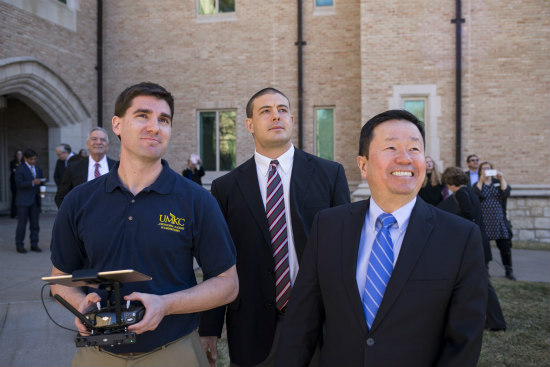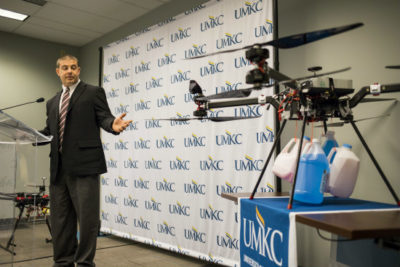Department of Defense awards $14.9 million to develop counter-drone technologies
The U.S. Department of Defense’s Office of Naval Research has awarded a $7.2 million grant and a $7.7 million contract to the University of Missouri-Kansas City to develop technologies to reduce national security threats from small, unmanned aerial vehicles, more commonly called drones.

Drones were flown in the UMKC quad during an event announcing the research funding.
These are the largest non-health research awards received at UMKC. The team of investigators also includes researchers from Missouri University of Science and Technology and the University of Missouri.
The grant was announced at the UMKC School of Computing and Engineering. Speakers were Barbara A. Bichelmeyer, interim chancellor and provost; Mun Y. Choi, president of the University of Missouri System; Missouri Rep. Gail McCann Beatty, House Minority Leader; and Anthony Caruso, UMKC assistant vice chancellor of research, physics and electronic engineering professor and principal investigator on the grant. UMKC Chancellor-Designate Mauli Agrawal attended the event.
Read a Q & A with Tony Caruso about the increasing threat of drones.

Travis Fields, left, assistant professor of engineering and UMKC’s drone guru, pilots a drone while Caruso and Mun Choi, UM System president, check it out.
Drones are commercially available to the general public and present an increasing threat. Once viewed simply as an unintended airspace nuisance, drones have demonstrated acts of terrorism that have increased in recent years.
Drone threats range from intelligence gathering, to delivery of a weaponized payload, to being caught in the air intake of a jet engine. The threat from drones, whether intentional or unintentional, is disproportionate in cost and complexity compared to the damage they can cause. For example, a few-hundred-dollar drone could destroy a billion-dollar stealth bomber.
Currently, no cost-effective protection from this potentially devastating threat exists.
“A prominent threat example is the low cost and ease of automation for deploying drones to collect video data or the transport of an unwanted material to a location five miles or greater from their launch point.”
-Tony Caruso, UMKC associate vice chancellor of research and physics and electrical engineering professor, and lead investigator on the grant
The four-year grant award will focus on advancing high-power microwave electronic countermeasure technologies. In addition to Caruso, the faculty team includes Plamen Doynov and Paul Rulis of the UMKC College of Arts and Sciences; Deb Chatterjee, Travis Fields, Ahmed Hassan and Faisal Khan of the UMKC School of Computing and Engineering; Daryl Beetner and Victor Kilkevich of Missouri S&T Electrical and Computer Engineering and Scott Kovaleski of MU Electrical Engineering and Computer Science.
The grant also will fund 10 new Ph.D. students, and provide positions for 12 new undergraduate researchers.

UMKC School of Computing and Engineering features a drone lab with drones of all shapes and sizes.
The goal of the efforts is to evaluate and demonstrate the capability of the counter-technologies developed through the grant award.
“These awards demonstrate the value UMKC research brings to our community and our state, in terms of stimulating our economy, showcasing our region’s scientific and technological leadership and safeguarding our citizens.”
-Barbara A. Bichelmeyer, UMKC interim chancellor and provost
This UMKC-led effort with Missouri S&T and MU also includes team members from the Kansas City National Security Campus; Radiation Detection Technologies in Manhattan, Kansas; BAE Systems in Nashua, New Hampshire and Austin, Texas; Eagle Harbor Technologies in Seattle, Washington; Lawrence Livermore National Laboratory in Livermore, California; Metamagnetics in Westborough, Massachusetts; Scientific Applications & Research Associates in Colorado Springs, Colorado; the Naval Research Laboratory in Washington, D.C.; Naval Air Warfare Center Weapons Division, China Lake, California; and, the Naval Surface Warfare Center Dahlgren Division in Dahlgren,Virginia.
“The counter-drone problem is considered a grand challenge — maybe even a wicked problem begging for a comprehensive study of present- and future-art countermeasures. This program will address and improve on countermeasures, significantly impacting the defense enterprise for Missouri.”
-Mun Y. Choi, president of the University of Missouri System
In previous awards from the Office of Naval Research, Caruso led a team of 20 faculty and students to create a portable nuclear radiation detector, taking the product from concept through prototype to production. R & D Magazine awarded the team an R & D 100 Award, the “Oscar of Invention,” for the detector, which improves homeland security by protecting people from potential risks from radioactive materials. The team included investigators from the University of Missouri and Kansas State University. The Caruso group is also working on countermeasures for high-power microwaves under the Office of Naval Research, Counter Directed Energy Weapons program.

